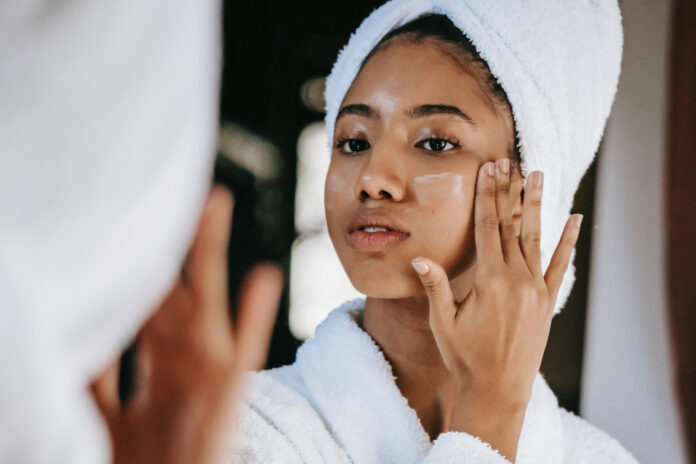Feeling frustrated because you often have excess skin grease, and your skin always looks shinier than you want it to? You’re not alone. A lot of people struggle with oily skin, and when it gets so hard to manage, it can take a toll on your self-confidence. Let’s see facial care do’s and don’ts for oily skin.
But did you know that your body’s natural oil — also known as sebum — is essential for protecting and hydrating your skin and keeping it fresh and glowing? Compared to dry skin, oily skin is slower to show signs of aging. Plus, it wards off wrinkles better than dry skin.
However, too much sebum produced by those overactive sebaceous glands causes way too many problems and constant headaches.
Do you have large, clogged pores on your nose, chin, and forehead? What about those never-ending blackhead and pimple breakouts and other acne problems? Do you always end up with a greasy, shiny face and makeup that has a dripping appearance? Yes, you can blame it all on an oily skin type.
Before it gets even more disheartening, you’ve got to know this: It’s perfectly normal to have oily skin. There are ways to treat and care for your oily skin and keep it in check.
Table of Contents
What causes oily skin?
You won’t be able to change the composition of your skin, but it’s good to find out the reasons why your skin gets so greasy. This way, you can effectively address the problem. Here are some top causes of oily skin.
1. Genetics and hormones
Does your mom, dad, or any other member of the family have oily skin? More or less, you got it from them, as larger sebaceous glands that lead to excess oil production are hereditary features that can be passed on.
Androgens are the hormones in your body that tell you that your sebaceous glands have matured, which can lead to an increase in oil production. Fluctuating hormones and hormonal imbalances — which often happen during puberty, menstruation, pregnancy, menopause, and other life and body changes — stimulate an increase in sebum production and cause oily skin.
2. Too much stress
Not being able to manage your stress levels can aggravate your skin. As your cortisol (the body’s stress hormone) level rises, the more your body produces excess oil. That’s why you end up with acne, pimples, blackheads, oily skin, and other skin problems — leaving you much more stressed than you were before.
3. Some medications and supplements
You may not realise that some of the medications and vitamins you’re taking may have side effects on your skin. Hormone replacement medicines, oral contraceptives, and some types of steroids, for example, may cause your glands to produce excess oil, while vitamin B12 supplements are known to trigger acne.
4. Weather, climate, and environment
Believe it or not, what happens between your bed sheets can irritate your skin, especially when these are made of materials that do not absorb oil production. Go for sheets that are made with natural fibers like linen and cotton.
Humid and hot weather can make your skin produce more sebum, leaving you feeling greasy and sticky in the summer. Rainy weather and cold climates, meanwhile, can leave your skin dry and cause those skin glands to ramp up oil production.
Oily Skin: The Do’s and Don’ts
Fixing oily skin is no easy fet — but it’s a challenge that you can definitely handle. We give you a rundown on a good facial skincare routine and some do’s and don’ts to effectively protect your skin from excess oil and achieve that healthy complexion you desire.
DO …
Cleanse well and usea tone
Wash your face gently and properly. Do this twice a day — in the morning and at night. Choose the right facial cleanser that best suits your skin type. Go for mild, oil-fighting cleansers made from fresh, natural agents. Plant-based ingredients like benzoyl peroxide, salicylic acid, neem, and tea tree oil work great for oily skin because they can keep your pores gunk-free.
Follow-up with a toner after cleansing. This will help replenish your skin, keep it hydrated, and balance your skin’s oil production.
Exfoliate and moisturize
Think using a good-old moisturier is counter-intuitive because you already have that greasy shine? Think again. Turns out, skipping moisturizer only makes things worse — you’ll be left with dry skin that triggers the sebaceous glands in producing more sebum to compensate for the lack of moisture.
Give your oily skin the hydration it needs by using the right moisturizer. Choose a lightweight formula that contains aloe vera, hyaluronic acid, and glycerine. These fresh agents will seal the moisture into your skin without clogging pores or causing acne.
Exfoliating once or twice a week will keep your skin healthy by removing impurities that may clog pores and by lightening dark spots. Chemical exfoliants that have a good combination of salicylic and glycolic acids are great for keeping excess oil at bay and lifting dead skin cells that can clog those pores.
Keep your makeup light and choose products wisely
Be more deliberate and choose cosmetic products that allow the skin to breathe. Creamy, heavy makeup will only worsen your skin issues and make room for a lot of clogged pores. Always use water-based, oil-free, and non-comedogenic makeup products that will draw out impurities to keep your pores clean and clear.
Eat healthily and drink plenty of water
Your food intake may be exacerbating your oily skin woes, so it’s best to switch things up and be diligent about maintaining a healthy diet. Fuel up on fruits, vegetables, fish, and nuts that are rich in anti-inflammatory Omega-3 and antioxidants that deliver essential nutrients to your skin.
Stay hydrated by drinking enough water — this will prevent dry skin without needing the sebaceous glands to produce too much sebum.
Wear sunscreen
Sunscreen is a must to protect your skin from dangerous sun damage. Pick the right type of sunscreen — a gel or light liquid formula that contains the mineral blockers zinc oxide and titanium dioxide can prevent acne breakouts.
DON’T …
Wash your face a little too much or use the wrong skincare products
It’s important to thoroughly wash the face and remove all the makeup, debris, and dead skin cells. But overdoing it and repeating it multiple times a day may cause more harm than good. Removing too much oil from the skin will strip it of moisture and cause your glands to overproduce oil. Also, resist the temptation to scrub your skin.
When prepping your face and putting on makeup, you must do it the right way. Going for heavier textures and using the wrong skincare products for your skin type will only lead to greasier skin and more breakouts. Go for high-quality products that are oil-free or non-comedogenic.
Over-exfoliate and over-moisturize
You may be tempted to over-moisturize and over-exfoliate to remove blackheads and unclog pores, but this will only dry out your skin and lead to an uptick in oil production. Plus, too much exfoliation may also cause flaking, discoloration, erosions, and redness.
Sleep while still wearing makeup
See to it that you remove every last bit of makeup off your face before you hit the sheets at night. Take your time to remove residue and use water and face wash to prep your skin for a good night regimen. L’Oreal Paris states that the right night cream fr your oily skin — one that’s lightweight and hydrating — will help moisturize, plump, and boost the repair cycle of your skin while you sleep.
Eat the wrong foods
Cut back on faty, processed foods, refined carbs, and sugar that can cause a spike in your skin’s oil production. Other foods that may lead to acne breakouts are milk, cheese, butter, and coffee, so it’s best to consume them in moderation. Stick to eating high-fiber, unprocessed, and low glycemic index (GI) foods that include vegetables, fruits, legumes, whole grains, and seeds.
Touch your face
Break the habit of touching your face way too many times throughout the day. This habit will not only make your face oilier but also transfer dirt and bacteria that may wreak havoc on your skin. Keep your hands off your face and don’t make the mistake of picking, popping, or squeezing those pimples.
Perfect Your Skincare Routine for Oily Skin
Undesired facial oiliness can be a bummer, and it can be very stressful to sift through the myriad of information about how to get rid of oily skin once and for all.
Knowing what to do and what not to do with oily skin is a significant first step towards keeping your skin healthy. It takes a great deal of discipline to follow a good skincare routine but if you do so step-by-step, then you’re well on your way to getting your oily skin under control.
Don’t hesitate to consult your trusted dermatologist for any questions and clarifications. A responsible dermatologist will be able to point you to the most effective skincare products and techniques that will help you master caring for your oily skin.
Ready to say goodbye to those acne breakouts and excess shine? Remember these do’s and don’ts, and nothing can stop you from achieving that perfect glow.





